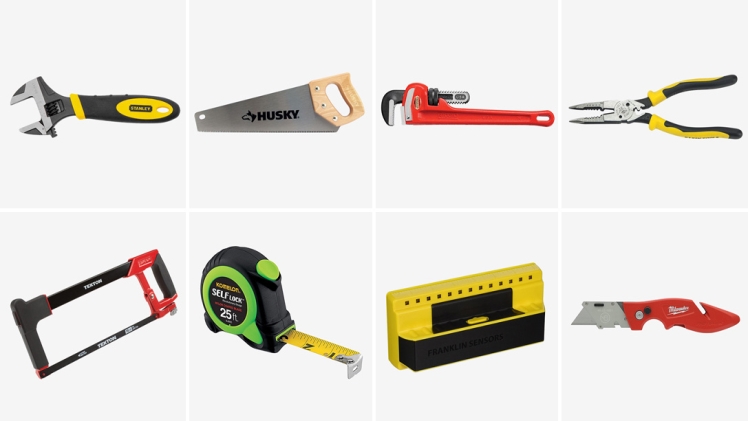Handymen have a wide arsenal of skills that they employ to provide services to clients. From landscaping work to plumbing, from electrical work to carpentry work, as a handyman, you need to be good at them all. In order to provide your services, you’ll need to be ready with every handyman tool you’re likely to need.
But with so many services offered, how do you know which tool you will need, and when? The answer is to be ready with all the common handyman tools you could need, at any given point in time.
How Do You Know Which Tools to Buy?
Before you go out to start purchasing your handyman tools, there are a few things you should keep in mind:
Every Handyman is Different
Handymen don’t all offer the same services. You may be good at carpentry work, but not know anything about electrical work. You may offer painting services, but not plumbing services. The kind of services you offer will depend on two factors. These include:
- Services you’re capable of offering, that you have the skilled and know-how to offer
- Services that you’re allowed to offer, as per the local regulations and codes
Since local codes and laws change from state to state, it’s a good idea to pore through your local regulations to see what services you can and can’t offer.
Generally, you can expect yourself to offer the following services, as a handyman:
- Carpentry work, such as fixing and repairing doors, windows, fences, as well as siding maintenance
- Small plumbing work, such as fixing clogged drains or leaky faucets
- Minor painting projects, such as painting fences
- Small electrical work, provided you have the skills and know-how
- Repairing drywall
- Repairing and installing tiles
A handyman can offer as many services, as they know how to do. You can easily find yourself doing work that’s not on this list.
Grow Your Collection of Tools Slowly
It could be expensive to simply rush out and start buying all the tools in this list. Instead, why not consider purchasing the most important tools first. You can, over time, keep adding other tools to your collection. This ensures that you don’t spend all your liquid capital on tools you may not need yet.
A good way to gauge whether you need a tool or not, is to see if you find yourself renting it often. If you’re renting a certain tool or kind of equipment often. Then it shows that you need that tool, and it may be time to get your own.
All Your Tools Don’t Need to Be High Quality
Buying high quality tools can be great – they are more durable, they are easier to use, and they can also help you to get the job done. However, high quality tools can also be expensive. You also don’t really need to buy high quality tools, unless you use them often.
If you find that you need to buy tools that you use rarely, then going for cheaper options may be a better idea. Cheaper tools can get the job done just as well, and you won’t have to worry about your money going to waste.
Every Tool You Need As A Handyman
Now that you know what kind of tools you need to purchase, it’s time to jump into the list of every tool you need, as a handyman.
Power Tools
Power tools are an important addition in every handyman’s tool box. Here is the list of handyman tools that you need:
Important Power Tools
You’ll find yourself using these tools often, for different projects. They include:
- Miter saw
- Brad Nailer
- Circular saw
- Reciprocating saw
- Power drill
- Handheld shop vacuum
- Jigsaw
- Heat gun
Commonly Used
Now that you know what power tools you absolutely need, it’s time to look into other tools that are commonly used as well:
- Mouse sander
- Paint sprayer
- Belt sander
- Router
- Framing nail gun
- Dremel set, including various tips
- Orbital sander
- Cordless oscillating tool
- Air compressor
- Power washer
- Impact drill
Hand Tools
Hand tools are essential for handyman, and you’ll find yourself needing to purchase a lot of them. The list of hand tools you need, include:
Important Hand Tools
These hand tools are the ones you’ll find yourself carrying in your tool bucket.
- Torpedo level
- Hammer
- Angle driver
- Trim pry bar
- Window scraper
- Wire strippers
- Wood chisel
- Cordless power drill
- Longnose pliers
- Measuring tape
- Stud finder
- Tongue and groove plier
- Screwdriver set
- Crimping tool with cutter
- Scissors
- Painters toolset
- Tin snips
- Drill bit set
- Pencil
- Nail set
- Large pick tool
- Handheld drywall saw
- Folding box knife
- Sharpie
- Hook and pick set
- Paint can opener
- Magnetic screw tip holder
The following are important hand tools that you need, but you don’t have to store in your tool bucket:
- Rubber mallet
- Hacksaw
- Staple gun
- Broom and dustpan
- Socket set
- Large pry bar
- Speed square
- Putty knife
- Caulking gun
- Precision screwdriver
- Clamps
- Hand sander
- Dry taping knife
- Allen wrenches
- 2′ and 4′ level
Common Hand Tools
These are hand tools that you may find yourself needing, from time to time:
- Mason chisel
- Hole saw
- Snapline
- File
- Compass
- Screw bit extension
- Stepped drill bit
- Door hinge jig
- Knob router jig
- Sledgehammer
- Combo square
Accessories for a Handyman
Aside from power tools and hand tools, you may also find yourself needing important accessories. These include:
Organization Accessories:
- Screw and nail organizers
- Toolbelt
- 5 gallon bucket, and bucket tool organizer
Accessories for Accessibility:
- Headlamp
- Ladder
- Extension cords
- Sawhorses
- Step stool
Accessories that Promote Health and Safety:
- Safety glasses
- Respirator
- Knee pads
- Mechanic gloves
- Nitrile gloves
- Earplugs
Aside from these, you should also purchase all the regular supplies you may need. These include a collection of screws, nails, nuts, bolts, fasteners, and other equipment you may need. If you offer painting, plumbing and electrical services, then you may also need to purchase tools for these jobs.
Conclusion
If you purchase all the tools mentioned in this list, then you’ll be ready to start your handyman business. Please remember that the tools mentioned here are the basic set of tools you need, to start working as a handyman. You may need to purchase additional tools, depending on the services you offer. Painting tools, plumbing tools, and other such specialized tools can also become essential to you if you offer those services.
As a handyman, you may find yourself encountering common career risks, from time to time. That’s why you should consider insurance for handyman. You could, for example, be sued by a disgruntled client, which could lead to a lawsuit. With the help of handyman general liability insurance, however, as well as other insurance for handyman, you can protect your finances. Get financial coverage with handyman liability insurance, and protect yourself against common career risks.

